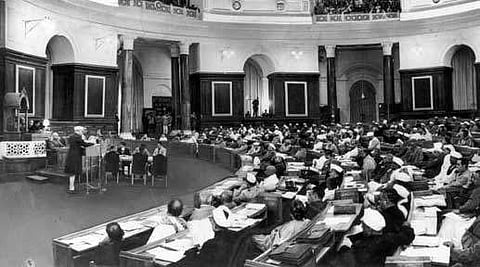

International scholars had difficulties in acknowledging the existence and success of Indian democracy in the first few decades after independence and it was only mentioned in the footnotes of books and research papers, according to the author of a new book on Indian democracy.
"But the situation started to change in the 1990s, when scholars started to say that democracy in India is robust, and there is free and fair elections, so maybe there is something to learn from India," Ornit Shani, the author and a lecturer in Israel's University of Haifa.
The book How India Became Democratic: Citizenship and the Making of the Universal Franchise brings to fore previously unknown stories about how Indians make their democracy in a way that was really driven by people "often by people with modest means", she told a select Washington audience during a book reading session organised by Indian Ambassador to the US, Navtej Sarna.
"Anyone who wrote about theories of democracy and democratisation, India was in the footnote, saying India is an anomaly, is an exceptional case. But of course, if you have an anomaly size of India, either you need a special theory for India or you need to rewrite theories of democracy," Shani said.
So, for Indians to gain appreciation, not to take for granted with democracy, to gain a new appreciation of what they have done may provide new inspirations, energy and ideas to cope with the challenges of the 21st century, she said in response to a question.
The challenges the West is now facing — multicultural societies, refugees and others — India dealt with them successfully, both in practice and in thinking, in the decades after its independence, she said.
"So, looking into the past experience of India may be the source for thinking about the many challenges we have," the author said.
Sarna, who himself is an accomplished scholar and author of several books, termed the book as "very important" as it documents the foundations of Indian democracy.
"It brings to light the thought and rigorous process that informed the birth of democracy's biggest experiment — the granting of the universal adult franchise to every Indian citizen," Sarna said.
"A sharing of this experience with US audiences only strengthens a sense of commonality of values between our two countries," Sarna said in response to a question.
Narrating the untold story of the preparation of the electoral rolls on the basis of universal franchise in the world's largest democracy, Shani offers a new view of institutionalisation of democracy in India, and the way democracy captures the political imagination of its diverse peoples.
Running into more than 250 pages, she shows how people of India were a driving force in the making of democracy as they struggled for their voting rights.
